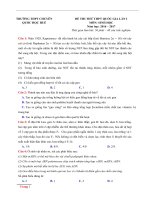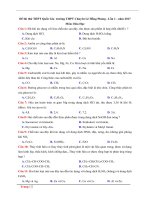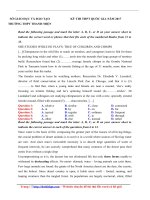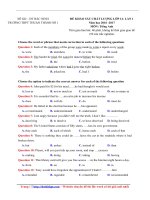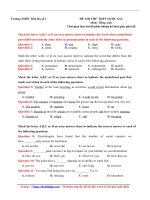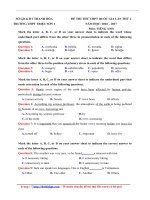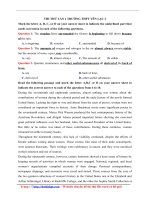- Trang chủ >>
- THPT Quốc Gia >>
- Ngoại Ngữ
thpt bai chay quang ninh mon tieng anh lan 1 nam 2017 file word co loi giai
Bạn đang xem bản rút gọn của tài liệu. Xem và tải ngay bản đầy đủ của tài liệu tại đây (185.94 KB, 14 trang )
TRƯỜNG THPT BÃI CHÁY
ĐỀ CHÍNH THỨC
(Đề thi có 06 trang)
KHẢO SÁT LẦN 1 THI THPT QUỐC GIA
NĂM HỌC 2016 - 2017
Môn thi: Tiếng Anh
Thời gian làm bài: 60 phút, không kể thời gian phát đề
Mã đề 001
Mark the letter A, B, C or D on your answer sheet to indicate the correct answer to each of
the following questions.
Question 1: Charles was wearing ________at the party.
A. a funny wide yellow silk tie
B. very funny wide yellow silk tie
C. a yellow silk funny tie
D. a tie yellow silk funny
Question 2: The top tourist ________in Vietnam, Ha Long bay features thousands of islands,
each topped with thick jungle vegetation, forming a spectacular seascape of limestone pillars.
A. attractive
B. attraction
C. attract
D. attractiveness
Question 3: I asked him ________ he understood what I was saying.
A. if not
B. if only
C. even if
D. if
Question 4: People ________ outlook on life is optimistic are usually happy people.
A. that
B. whom
C. who
D. whose
Question 5: My dog ________ my cats eats twice a day.
A. as well as
B. both
C. or
D. nor
Question 6: After they ________ all the food, they picked up their bags and left.
A. had eaten
B. have eaten
C. was eating
D. ate
Question 7: The more electricity you use, ________.
A. the more money you made
B. the more bill you are
C. the higher your bill is
D. the best money you pay
Question 8: ________, he would have been able to pass the exam.
A. If he studied hardly last year
B. Had he studied harder last year
C. Provided he studied hard last year
D. Studying harder last year
Question 9: It is ________ of businessmen to shake hands in formal meetings.
A. familiar
B. typical
C. ordinary
D. common
Question 10: The summer power outage shut the air conditioning ________ throughout the
whole neighborhood.
A. up
B. in
C. down
D. out
Question 11: At present they are visiting all parts of the country. They are doing this
________.
A. in future
B. for a short time
C. now
D. all the time
Question 12: The majority of Asian students reject the American ________ that marriage is a
partnership of equals.
A. look
B. attitude
C. thought
D. view
Mark the letter A, B, C or D on your answer sheet to indicate the word that differs from the
– Chuyên đề thi file word có lời giải chi tiết mới nhất
Trang 1
other three in the position of the primary stress in each of the following questions.
Question 13:
A. future
B. prospect
C. guidance
D. involve
Question 14:
A. confidential
B. relationship
C. enthusiast
D. endangerment
Mark the letter A, B, C or D on your answer sheet to indicate the most suitable respond to
complete each of the following exchanges.
Question 15: Mary: “May I leave a message for Mrs. Davis?”
Thomas: “________”
A. I’m afraid she is not here at the moment. B. No, she’s not here now.
C. She’s leaving a message for you now.
D. Yes, I’ll make sure she gets it.
Question 16: Dan: “It was very kind of you to help me out, Paul?”
Paul: “________”
A. I’m glad you like it
B. Thanks a million.
C. That was the least I could do
D. You can say that again.
Mark the letter A, B, C or D on your answer sheet to indicate the word(s) OPPOSITE in
meaning to the underlined word(s) in each of the following questions.
Question 17: Military is compulsory in this country. Every man who reaches the age of 18
has to serve in the army for two years.
A. required
B. optional
C. illegal
D. unnecessary
Question 18: Because John defaulted on his loan, the bank took him to court.
A. failed to pay
B. paid in full
C. had a bad personality
D. was paid much money
Mark the letter A, B, C or D on your answer sheet to indicate the underlined part that needs
correction in each of the following questions.
Question 19: The medical science began with the Greek Hippocrates, who earned for himself
the title of father of Medicine.
A. the title
B. The medical science C. the Greek
D. for himself
Question 20: Air pollution, together with littering, are causing many problems in your large,
industrial cities today.
A. are causing
B. many problems
C. with littering
D. industrial cities
Question 21: It was suggested that your father gave up smoking for the sake of himself.
A. was suggested
B. gave
C. smoking
D. himself.
Mark the letter A, B, C or D on your answer sheet to indicate the word whose underlined
part differs from the other three in pronunciation in each of the following questions.
Question 22:
A. international
B. integration
C. immigration
D. operation
Question 23:
A. admit
B. confide
C. decide
D. retire
Mark the letter A, B, C or D on your answer sheet to indicate the word(s) CLOSEST in
– Chuyên đề thi file word có lời giải chi tiết mới nhất
Trang 2
meaning to the underlined word(s) in each of the following questions.
Question 24: Whenever problems come up, we discuss them frankly and find solutions
quickly.
A. encounter
B. arrive
C. clean
D. happen
Question 25: The overall aim of the book is to help bridge the gap between theory and
practice, particularly in language teaching.
A. reduce the differences
B. minimize the limitations
C. construct a bridge
D. increase the understanding
Read the following passage and mark the letter A, B, C or D on your answer sheet to
indicate the correct answer to each of the questions from 26 to 33.
Esperanto is what is called a planned, or artificial language. It was created more than a
century ago by Polish eye doctor Ludwik Lazar Zamenhof. Zamenhof believed that a common
language would help to alleviate some of the misunderstandings among cultures.
In Zamenhof’s first attempt at a universal language, he tried to create a language that was
as uncomplicated as possible. This first language included words such as ab, ac, eb, be and
ce. This did not result in a workable language in that these monosyllabic, though short, were
not easy to understand or to retain.
Next, Zamenhof tried a different way of constructing a simplified language. He made the
words in his language sound like words that people already knew, but he simplified the
grammar tremendously. One example of how he simplified the language can be seen in the
suffixes: all nouns in this language end in o, as in the noun amiko, which means “friend”, and
all adjectives end in -a, as in the adjective bela, which means “pretty. Another example of the
simplified language can be seen in the prefix mal-, which makes a word opposite in meaning,
the word malamiko therefore means “enemy”, and the word malbela therefore means “ugly”
in Zamenhof’s language.
In 1887, Zamenhof wrote a description of this language and published it. He used a pen
name, Dr. Esperanto, when signing the book. He selected the name Esperanto because this
word means “a person who hopes” in his language. Esperanto clubs began popping up
throughout Europe, and by 1950, Esperanto had spread from Europe to America and Asia.
In 1905, the First World Congress of Esperanto took place in France, with approximately
700 attendees from 20 different countries. Congresses were held annually for nine years, and
4,000 attendees were registered for the Tenth World Esperanto Congress scheduled for 1914,
when World War I erupted and forced its cancellation.
Esperanto has had its ups and downs in the period since World War I. Today, years after
it was introduced, it is estimated that perhaps a quarter of a million people are fluent in it.
This may seem like a large number, but it is really quite small when compared with the billion
English speakers and billion Mandarin Chinese speakers in today’s world. Current advocates
would like to see its use grow considerably and are taking steps to try to make this happen.
Question 26: The topic of this passage is ________.
A. one man’s efforts to create a universal language
– Chuyên đề thi file word có lời giải chi tiết mới nhất
Trang 3
B. using language to communicate internationally
C. a language developed in the last few years
D. how language can be improved
Question 27: According to the passage, Zamenhof wanted to create a universal language
A. to build a name for himself
B. to provide a more complex language
C. to create one world culture
D. to resolve cultural differences
Question 28: The expression “popping up” could best be replaced by ________.
A. opening
B. shouting
C. hiding
D. leaping
Question 29: According to passage, what happened to the Tenth World Esperanto Congress?
A. It had attendees from 20 countries
B. It had 4,000 attendees
C. It never took place
D. It was scheduled for 1915
Question 30: The expression “ups and downs” is closest in meaning to ________.
A. highs and lows
B. floors and ceilings
C. take offs and landings
D. tops and bottoms.
Question 31: Which paragraph describes the predecessor to Esperanto?
A. The first paragraph
B. The second paragraph
C. The third paragraph
D. The fourth paragraph
Question 32: The passage would most likely be assigned reading in a course on ________.
A. European history B. English grammar C. world government D. applied linguistics
Question 33: The paragraph following the passage most likely discusses ________.
A. attempts to reconvene the World Congress of Esperanto in the 1920s.
B. how current supporters of Esperanto are encouraging its growth
C. the disadvantages of using an artificial language
D. another of Zamenhof’s accomplishments
Read the following passage and mark the letter A, B, C or D on your answer sheet to
indicate the correct answer to each of the questions from 34 to 40.
The time when humans crossed the Arctic land bridge from Siberia to Alaska seems
remote to us today, but actually represents a late stage in prehistory of humans, an era when
polished stone implements and bows and arrows were already being used and dogs had
already been domesticated.
When these early migrants arrived in North America, they found woods and plains
dominated by three types of American mammoths. Those elephants were distinguished from
today’s elephants mainly by their thick, shaggy coats and their huge, upward-curving tusks.
They had arrived on the continent hundreds of thousands of years before their human
followers. The wooly mammoth in the North, the Columbian mammoth in middle North
America, and the imperial mammoth of the South together with their distant cousins the
mastodons, dominated the land. Here, as in the Old World, there is evidence that humans
hunted these elephants, as shown by numerous spear points found with mammoth remains.
Then, at the end of the Ice Age, when the last glaciers had retreated, there was a relatively
sudden and widespread extinction of elephants. In the New World, both mammoths and
– Chuyên đề thi file word có lời giải chi tiết mới nhất
Trang 4
mastodons disappeared. In the Old World, only Indian and African elephants survived.
Why did the huge, seemingly successful mammoths disappear? Were humans connected
with their extinction? Perhaps, but at the time, although they were hunters, humans were still
widely scattered and not very numerous. It is difficult to see how they could have prevailed
over the mammoth to such an extent.
Question 34: With which of the following is the passage primarily concerned?
A. Techniques used to hunt mammoths.
B. The relationship between man and mammoth in the New World.
C. The prehistory of humans.
D. Migration from Siberia to Alaska.
Question 35: It can be inferred that when humans crossed into the New World, they
________.
A. had previously hunted mammoths in Siberia.
B. had never seen mammoths before.
C. brought mammoths with them from the Old World.
D. soon learned to use dogs to hunt mammoths.
Question 36: The phrase “these early migrants” in paragraph 2 refers to ________.
A. mammoths
B. humans
C. dogs
D. mastodons
Question 37: The passage supports which of the following conclusions about mammoths?
A. Humans hunted them to extinction.
B. The freezing temperatures of the Ice Age destroyed their food supply.
C. The cause of their extinction is not definitely known.
D. Competition with mastodons caused them to become extinct.
Question 38: The word “implements” in paragraph 1 is closest in meaning to ________.
A. tools
B. ornaments
C. houses
D. carvings
Question 39: Where were the imperial mammoths the dominant type of mammoth?
A. Alaska
B. the central portion of North America
C. the southern part of North America
D. South America
Question 40: Which of the following could best substitute for the word “remains” in
paragraph 2?
A. bones
B. drawings
C. footprints
D. spear points
Read the following passage and mark the letter A, B, C or D on your answer sheet to
indicate the correct word or phrase that best fits each of the numbered blanks from 41 to
45.
Reference books are not designed to be read from the first page to the last but rather to be
consulted to answer the questions and provide both general and specific pieces of information.
One of the most (41) ________-used reference books is a dictionary, which provides
information about words. It lists meanings and spellings, (42)________how a word is
pronounced, gives examples of how it is used, may reveal its origins and also lists synonyms
and antonyms. To help you find the words faster, there are guide words at the top of each page
– Chuyên đề thi file word có lời giải chi tiết mới nhất
Trang 5
showing the first and last words on the page and of course it (43) ________ to know the
alphabet!
There may be numerous special sections at the back with facts about famous people and
places, lists of dates and scientific names, etc. There is usually a section at the front
explaining how to use the dictionary, which includes the special abbreviations or signs.
An atlas is also a reference book and (44) ________ charts, tables and geographical facts,
as well as maps. Political maps locate countries and cities, physical maps show the formation
of the land with its mountains and valleys, and economic maps show industries and
agriculture. To find a specific place, you need to look in the index at the back of the atlas and
the exact position on the map. There are numerous map (45) ________ that you need to know
in order to be able to read a map-almost like a special language-and these are explained at the
front of the atlas.
Question 41: A. greatly
B. widely
C. mainly
D. largely
Question 42: A. speaks
B. tells
C. says
D. gives
Question 43: A. assists
B. pays
C. helps
D. works
Question 44: A. contains
B. composes
C. includes
D. consists
Question 45: A. marks
B. signs
C. signals
D. symbols
Mark the letter A, B, C or D on your answer sheet to indicate the sentence that is closest
meaning to each of the following questions.
Question 46: The newspaper reports that James was awarded the first prize.
A. The first prize is reported to award to James
B. It is reported that James to be awarded the first prize.
C. It is reported that James wins the first prize.
D. James is reported to have been awarded the first prize.
Question 47: “No, I didn’t tell Jim our plan,” said Tom.
A. Tom denied to tell Jim their plan.
B. Tom didn’t agree to tell Jim their plan.
C. Tom denied having told Jim their plan.
D. Tom refused to tell Jim their plan.
Question 48: If only I had taken his advice.
A. I wish I followed his advice.
B. I wish I have taken his advice.
C. I regret not having taken his advice.
D. I regret not to take his advice.
Question 49: It’s no use trying to persuade Tom to change his mind.
A. There’s no point to try to persuade Tom to change his mind.
B. It’s useful trying to persuade Tom to change his mind.
C. It’s worth trying to persuade Tom to change his mind.
D. It’s a waste of time trying to persuade Tom to change his mind.
Question 50: Much as he loved her, he didn’t forgive her for what she had done.
A. He didn’t forgive her for what she had done as he loved her.
B. She didn’t love him as much as he loved her.
C. He didn’t forgive her for what she had done because she didn’t love him as much.
D. Although he loved her, he didn’t forgive her for what she had done.
– Chuyên đề thi file word có lời giải chi tiết mới nhất
Trang 6
--------- HẾT --------Thí sinh khơng được sử dụng tài liệu, cán bộ coi thi khơng giải thích gì thêm.
Chữ ký giám thị số 1: ....................................Chữ ký giám thị số 2: ...........................................
– Chuyên đề thi file word có lời giải chi tiết mới nhất
Trang 7
HƯỚNG DẪN GIẢI CHI TIẾT
Thực hiện: Ban Chuyên môn Tuyensinh247.com
1. A
2. B
3. D
4. D
5. A
6. A
7. C
8. B
9. B
10. C
11. C
12. D
13. D
14. A
15. D
16. C
17. B
18. B
19. D
20. A
21. D
22 A
23 A
24. D
25 A
26. A
27 D
28. D
29. C
30 A
31. B
32. D
33. B
34. B
35 A
36. B
37 C
38 A
39. D
40. A
41. B
42. B
43. C
44 A
45. D
46. D
47. C
48. C
49. D
50. D
Mark the letter A, B, C or D on your answer sheet to indicate the correct
answer to each of the following questions.
1. A
Thứ tự tính từ trong tiếng Anh:
164465
1
2
3
4
5
6
General
opinion
Specific
opinion
(funny)
Size
(wide)
Age
Shape
Colour
(yellow)
Tính từ chỉ
quan điểm, ý
kiến một cách
chung chung
Tính từ chỉ
quan điểm, ý
kiến một
cách cụ thể
Tính
từ chỉ
kích
cỡ
Tính
từ chỉ
tuổi
tác
Tính
từ chỉ
hình
dạng
Tính từ màu
sắc
7
8
Nationality/ Material
origin
(silk)
Tính từ chỉ
quốc tịch,
nguồn gốc
Tính từ
chất liệ
Trước danh từ cần có mạo từ, trong trường hợp này là mạo từ không xác định vì cái mũ
chưa bao giờ được nhắc đến. => a funny wide yellow silk tie.
2. B
‘tourist attraction’ : điểm thu hút khách du lịch, (compound noun) => ‘attraction’ là đúng
nghĩa nhất trong hồn cảnh này.
Attractive: có tính thu hút (adj)
Attract: thu hút (v)
Attractiveness: sự hấp dẫn lôi cuốn (n)
3. D
Câu hỏi trong lời nói gián tiếp:
Câu hỏi bắt đầu với các trợ động từ (khơng có từ hỏi): thêm if/ whether
I asked: 'Do you understand what I am saying?'
→ I asked him if he understood what I was saying. (Tôi hỏi anh ấy liệu anh ấy có hiểu tơi
đang nói gì khơng.) or I asked him if he understood what I was saying.’
4. D
Đại từ quan hệ ‘whose’ thay thế cho sở hữu của người.
=> People whose outlook on life is optimistic are usually happy people. (Những người có
quan điểm sống lạc quan thường là những người hạnh phúc.)
5. A
As well as = and (và) : Có thể dùng "as well as" để nối hai chủ ngữ. Nếu chủ ngữ đầu là
– Chuyên đề thi file word có lời giải chi tiết mới nhất
Trang 8
số ít thì động từ theo sau nó cũng chia tương ứng với chủ ngữ số ít đó.
=> My dog as well as my cats eats twice a day. (Chó và mèo của tơi ăn 2 lần 1 ngày.)
6. A
Thì quá khứ tiếp diễn dùng với một hành động diễn ra trước một thời điểm trong quá khứ.
Thời điểm họ nhặt túi của mình rồi bỏ đi ở trong quá khứ, thì hành động ăn diễn ra trước hành
động bỏ đi => Hành động ăn chia ở thì quá khứ tiếp diễn had eaten
7. C
Cấu trúc so sánh kép
Double comparison (So sánh kép)
+ Cùng một tính từ/trạng từ:
- Tính từ/Trạng từ ngắn: S + V + adj/adv + er + and + adj/adv + er
- Tính từ/trạng từ dài: S + V + more and more + adj/adv
+ Dạng khác: (càng...càng...) The + S + V + the + comparative + S + V (...)
The more electricity you use, the higher your bill is. (Bạn dùng càng nhiều điện, hóa
đơn tiền điện của bạn càng cao.)
8. B
Câu điều kiện loại 3 diễn tả điều không thể diễn ra trong quá khứ.
Cấu trúc: If + S + Had + V3/Ved, S + would/ could...+ have + V3/Ved
Cấu trúc đảo ngữ: Had + S1 + (not) + past participle, S2 + would/might/could.. + have +
past participle.
=> Had he studied harder last year, he would have been able to pass the exam. (Nếu anh
ấy học siêng năng hơn năm ngoái, lẽ ra anh ấy đã có thể đỗ kì thi.)
9. B
typical of: tiêu biểu, đặc thù
ordinary = common: thông thường
familiar with : quen thuộc với
=> It is typical of businessmen to shake hands in formal meetings. (Việc bắt tay của các
doanh nhân trong các buổi họp quan trọng là rất tiêu biểu.)
10. C
Shut down : Tắt, ngắt, ngừng
Shut in: giam giữ
Shut up: im lặng
Shut out: chặn lối
=> The summer power outage shut the air conditioning down throughout the whole
neighborhood. (Việc trạm điện mùa hè ngưng hoạt động đã làm tắt thiết bị điều hịa tồn bộ
khu dân cư.)
11. C
At present = now : ngay bây giờ, hiện tại.
All the time: Luôn luôn (dùng trong câu hiện tại đơn)
In future: trong tương lai
For a short time: Một thời gian ngắn.
At present they are visiting all parts of the country. They are doing this now.
– Chuyên đề thi file word có lời giải chi tiết mới nhất
Trang 9
Bây giờ họ đang đi thăm các tỉnh của đất nước. Họ đang làm việc đó ngay lúc này
12. D
Look: cách nhìn
Attitude: thái độ
Thought: suy nghĩ
View: quan điểm.
=> The majority of Asian students reject the American view that marriage is a partnership
of equals. (Phần lớn sinh viên châu Á bác bỏ quan điểm của người Mỹ rằng hôn nhân là mối
quan hệ dựa trên sự bình đẳng.)
164478 Mark the letter A, B, C or D on your answer sheet to indicate the word that
differs from the other three in the position of the primary stress in each of the following
questions.
13. D
future /ˈfjuːtʃə(r)/
prospect /ˈprɒspekt/ guidance /ˈɡaɪdns/
involve /ɪnˈvɒlv/
=> trọng âm nhấn vào âm tiết thứ 2, những từ còn lại trọng âm nhấn vào âm tiết thứ nhất.
14. A
confidential /ˌkɒnfɪˈdenʃl/
relationship /rɪˈleɪʃnʃɪp/
enthusiast /ɪnˈθjuːziæst/
endangerment /ɪnˈdeɪndʒə(r)mənt/
=> trọng âm nhấn vào âm tiết thứ 3, những từ còn lại trọng âm nhấn vào âm tiết thứ hai.
164481 Mark the letter A, B, C or D on your answer sheet to indicate the most suitable
respond to complete each of the following exchanges.
15. D
I’m afraid she is not here at the moment. : Tôi e rang bà ấy khơng có ở đây lúc này.
No, she’s not here now. : Khơng cơ ấy khơng có mặt ở đây lúc này.
She’s leaving a message for you now. : Cô ấy sẽ gửi lời nhắn cho bạn ngay bây giờ.
Yes, I’ll make sure she gets it. : Vâng, tôi sẽ chắc chắn rằng cô ấy nhận được.
=> Câu trả lời D là hợp lí nhất.
16. C
I’m glad you like it. : Tơi mừng là bạn thích nó.
Thanks a million.: Cảm ơn rất nhiều.
That was the least I could do. : Đó là điều ít nhất mà tơi có thể làm.
You can say that again. : Bạn có thể nói lại điều đó.
=> Câu trả lời C là hợp lí nhất.
164484 Mark the letter A, B, C or D on your answer sheet to indicate the word(s)
OPPOSITE in meaning to the underlined word(s) in each of the following questions.
17. B
Compulsory (bắt buộc) >< Optional (Tự chọn)
Required: bắt buộc Illegal: bất hợp pháp Unnecessary: không cần thiết
18. B
Default (không trả được) >< Pay in full (trả đầy đủ)
Fail to pay: không trả được
Have a bad personality: Có nhân cách xấu Pay much money: Trả nhiều tiền
– Chuyên đề thi file word có lời giải chi tiết mới nhất
Trang
10
Mark the letter A, B, C or D on your answer sheet to indicate the underlined
part that needs correction in each of the following questions.
19. D
Cấu trúc ‘earn oneself a name/ a title’: làm cho bản thân ai nổi tiếng.
Earn for himself => earn himself
20. A
Air pollution, together (with) littering, (are) causing (many) problems (in our large),
industrial cities today.
Đây là sự hòa hợp giữa chủ ngữ và danh động từ => động từ chia theo chủ ngữ số ít.
Are causing => Is causing
21. D
For the sake of someone: Vì quyền lợi của ai đó.
Himself => Him.
164491 Mark the letter A, B, C or D on your answer sheet to indicate the word whose
underlined part differs from the other three in pronunciation in each of the following
questions.
22. A
international /ˌɪntəˈnæʃnəl/
integration /ˌɪntɪˈɡreɪʃn/
immigration /ˌɪmɪˈɡreɪʃn/
operation /ˌɒpəˈreɪʃn/
=> Phát âm là /ỉ/, những từ cịn lại phát âm là /ei/
23. A
admit /ədˈmɪt/
confide /kənˈfaɪd/
decide /dɪˈsaɪd/
retire /rɪˈtaɪə(r)/
=> Phát âm là /ə/, những từ còn lại phát âm là /ai/
164494 Mark the letter A, B, C or D on your answer sheet to indicate the word(s)
CLOSEST in meaning to the underlined word(s) in each of the following questions.
24. D
Come up = happen (xuất hiện, diễn ra)
Encounter: chạm trán, đụng độ, trải qua.
Arrive: đến
Clean: dọn dẹp
25. A
Bridge the gap = reduce the differences (thu hẹp khoảng cách, thu hẹp khác biệt)
Minimize the limitations: tối thiểu hóa giới hạn
Construct a bridge: xây một cái cầu
Increase the understanding: tăng sự thấu hiểu
164497 Read the following passage and mark the letter A, B, c or D on your answer
sheet to indicate the correct answer to each of the questions from 26 to 33.
26. A
Toàn bộ đoạn văn nói về nỗ lực của Zamenhof trong việc xây dựng một ngơn ngữ riêng
mang tính tồn cầu.
=> one man’s efforts to create a universal language.
27. D
164487
– Chuyên đề thi file word có lời giải chi tiết mới nhất
Trang
11
Câu cuối cùng đoạn thứ nhất: “Zamenhof believed that a common language would help
to alleviate some of the misunderstandings among cultures.” (Zamenhof tin rằng một ngôn
ngữ chung sẽ giúp giảm thiểu sự bất đồng giữa những nền văn hóa.)
28. D
Pop up = leap (nhảy lên, nổi lên)
Open: mở ra Shout: hét lên
Hide: ẩn nấp
29. C
Câu cuối cùng, đoạn thứ 5: “Congresses were held annually for nine years, and 4,000
attendees were registered for the Tenth World Esperanto Congress scheduled for 1914, when
World War I erupted and forced its cancellation.” (Hội nghị được tổ chức hằng năm trong
vòng 9 năm, và 4000 người đã đăng kí tham gia hội nghị Esperanto Thế giới lần thứ 10 dự
kiến tổ chức năm 1914, khi Chiến tranh thế giói thứ Nhất nổ ra và bắt buộc Hội nghị bị hủy
bỏ.)
30. A
Ups and downs = highs and lows (Có lúc thăng lúc trầm)
31. B
Đoạn văn thứ 2 nơi về tiền thân của ngôn ngữ Esperanto. “In Zamenhof’s first attempt at
a universal language, he tried to create a language that was as uncomplicated as possible. This
first language included words such as ab, ac, eb, be and ce. This did not result in a workable
language in that these monosyllabic, though short, were not easy to understand or to retain.”(
Nỗ lực ban đầu của Zamenhof với ngơn ngữ tồn cầu, ông đã cố gắng tạo ra một thứ ngôn
ngữ ít phức tạp hết mức có thể. Thú ngơn ngữ đầu tiên này bao gồm những từ như ab, ac, eb,
be và ce. ...”)
32. D
Đoạn văn này rất có thể được tìm thấy trong bài đọc của khóa học “Ngơn ngữ ứng dụng.”
=> applied linguistic
33. B
Đoạn văn theo sau bài viết bàn về những người hiện tại ủng hộ ngôn ngữ Esperanto đang
cổ vũ cho sự phát triển của nó.
Esperanto has had its ups and downs in the period since World War I. Today, years after
it was introduced, it is estimated that perhaps a quarter of a million people are fluent in it.
This may seem like a large number, but it is really quite small when compared with the billion
English speakers and billion Mandarin Chinese speakers in today’s world. Current advocates
would like to see its use grow considerably and are taking steps to try to make this happen.
(“...Những người tan thành hiện tại rất mong muốn được thấy sự phát triển của ngôn ngữ
Esperanto và đang từng biết cố gắng biến điều đó thành hiện thực.”)
164506 Read the following passage and mark the letter A, B, C or D on your answer
sheet to indicate the correct answer to each of the questions from 34 to 40.
34. B
Bài viết nói về mối quan hệ giữa người và voi ma mút ở Thế giói Mói.
– Chuyên đề thi file word có lời giải chi tiết mới nhất
Trang
12
Câu thứ nhất, đoạn thứ 2. “When these early migrants arrived in North America, they
found woods and plains dominated by three types of American mammoths.” (Khi những
người di cư đến Bắc Mỹ (Thế giới Mới) họ tìm thấy rừng và những khu đất đai rộng lớn thống
trị bởi 3 loại voi ma mút Mỹ.)
35. A
Đoạn thú 2, câu cuối cùng: “Here, as in the Old World, there is evidence that humans
hunted these elephants, as shown by numerous spear points found with mammoth remains ”
(Ở đây, nơi thế giới Cũ, vẫn còn bằng chứng rằng con người từng săn bắt những con voi này,
đuợc thể hiện bởi nhiều vết mác sắc nhọn tìm thấy hóa thạch voi ma mút.)
36. B
These early migrants đang nói về con người, khi người ta đặt chân đến Bắc Mỹ đã nhận
thấy sự thống trị của loài voi ma mút.
37. C
Đoạn cuối cùng của bài viết: “Why did the huge, seemingly successful mammoths
disappear? Were humans connected with their extinction? Perhaps, but at the time, although
they were hunters, humans were still widely scattered and not very numerous. It is difficult to
see how they could have prevailed over the mammoth to such an extent.” (Tại sao loài ma
mút khổng lồ, thống trị như vậy lại biến mất? Liệu con người có liên quan đến sự tuyệt chủng
của chúng khơng?” => Lí do của sự tuyệt chung vẫn chưa được biết.
38. A
Implements = tools (công cụ, vật dụng)
Ornament: đồ trang trí House: nhà cửa
Carving: bức chạm khắc
39. D
Đoạn thứ 2, câu thứ 4: “.. .the imperial mammoth of the South together with their distant
cousins the mastodons, dominated the land” (Loại ma mút hồng gia ở phía Nam cùng với họ
hàng xa của nó lồi voi răng mấu, thống trị vùng đất.)
40. A
Remain = bones : những gì cịn lại của voi ma mút chi là xương hóa thạch.
164514 Read the following passage and mark the letter A, B, c or D on your answer
sheet to indicate the correct word of phrase that best fits each of the numbered blanks
from 41 to 45.
41. B
Widely-used: được sử dụng rộng rãi
Mainly: chính
Largely: rộng lớn
Greatly: rất nhiều, vĩ đại
=> widely-used
42. B.
tell: nói (thường theo sau là tân ngữ)
Các từ cịn lại khơng dùng được:
Give something to someone/ give someone something: đưa cái gì cho ai
Say: thường dùng để trân thuật lại lời nói của ai đó.
– Chuyên đề thi file word có lời giải chi tiết mới nhất
Trang
13
Speak (to someone): nói chuyện với ai
=> tells
43. C
help to know: giúp để biết các động từ còn lại
Assist someone in/with something: giúp đõ ai về...
Pay for: trả (tiền) cho ...
Work: làm việc
44. A
contain: bao gồm ...(mang nghĩa bao hàm, chứa đựng)
Các từ còn lại:
Compose và consist thường theo sau là giói từ “of’.
Include: gồm (mang nghĩa có liên quan)
45. D
map symbol: biểu tương trong bản đồ Các từ còn lai: mark: điểm; sigmdấu hiệu; signal:
dấu hiệu
164525 Mark the letter A, B, C or D on your answer sheet to indicate the sentence that
is closest meaning to each of the following questions.
46. D
Câu tường thuật dạng bị động sử dụng theo cấu trúc:
Mẫu câu chủ động: S1 + V1(that) + S2 + V2 +....
Bị động each 2: S2 + be + V1 p.p + to V2 + ....
=> James is reported to have been awarded the first prize.
47. C
Câu chủ động Tom trực tiếp phủ nhận việc nói cho Jim biết kế hoạch, đổi sang câu bị
động sử dụng cấu trúc ‘deny’ + doing something.
Do hành động này đã ở quá khứ => Tom denied having told Jim...
48. C
cấu trúc If only + quá khứ hoàn thành thể hiện điều không thật ở quá khứ. => Chủ ngữ
nuối tiếc một điều trong quá khứ => Cấu trúc regret + doing something. Vì hành động này đã
diễn ra từ trước => regret not having taken his advice.
49. D
It’s not use trying to persuade Tom to change his mind. (Chẳng có ích gì thuyết phục Tom
thay đổi suy nghĩ) => sử dụng cấu trúc a waste of time doing something.
50. D
Much as he loved her = No matter how much he loved her (bất kể anh ấy yêu cô ta nhiều
nhu thế nào)
Câu này đồng nghĩ với câu ‘although he loved her, he didn’t forgive her for what she had
done’ (Mặc dù anh ấy yêu cô ấy, anh ấy không thể tha thứ cho những gì cơ ấy đã làm.)
– Chun đề thi file word có lời giải chi tiết mới nhất
Trang
14
